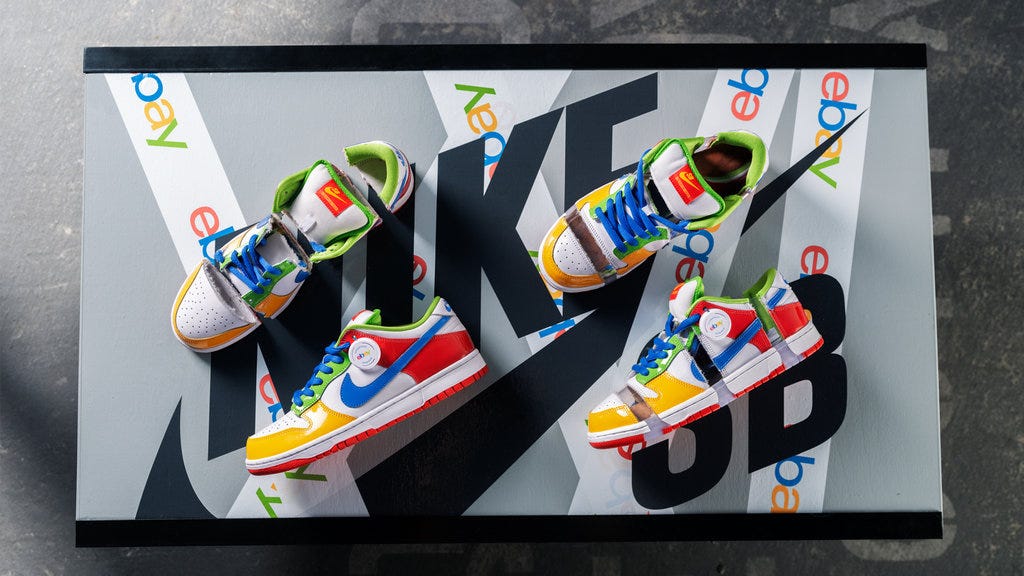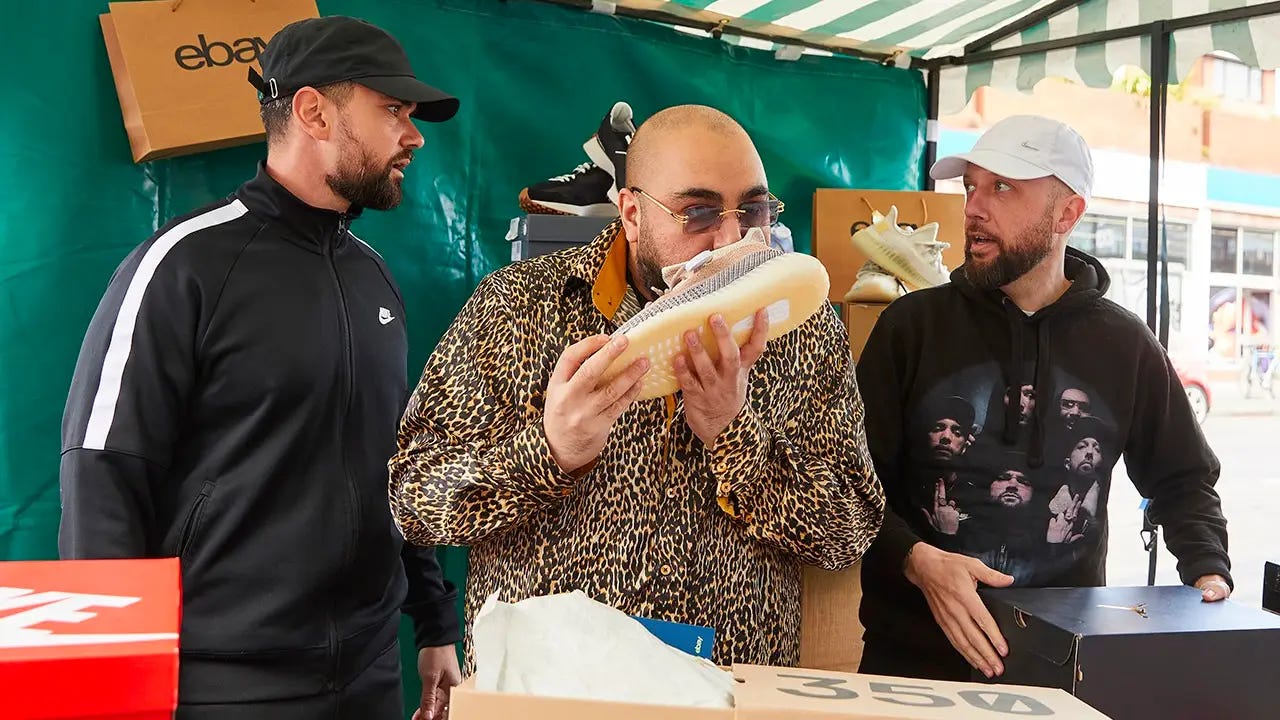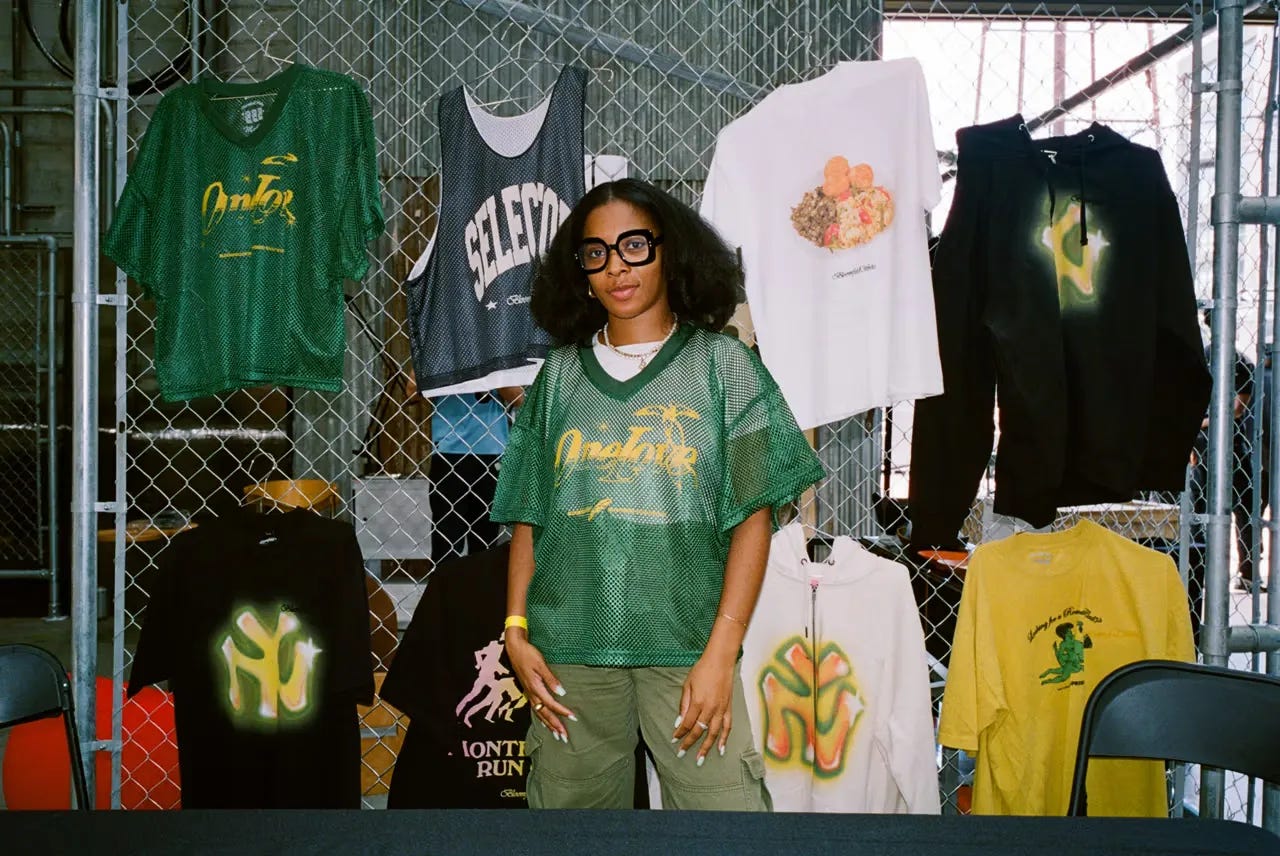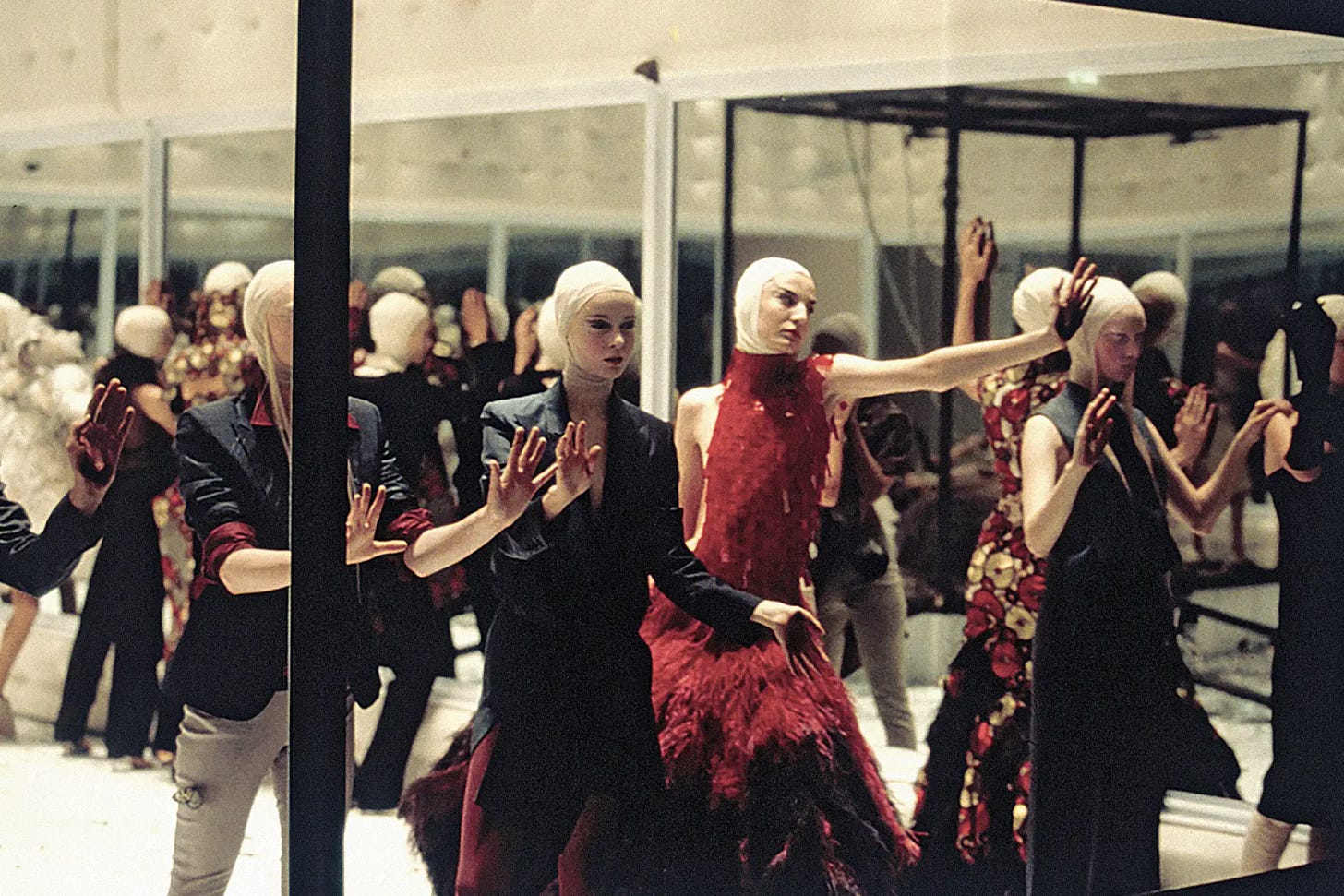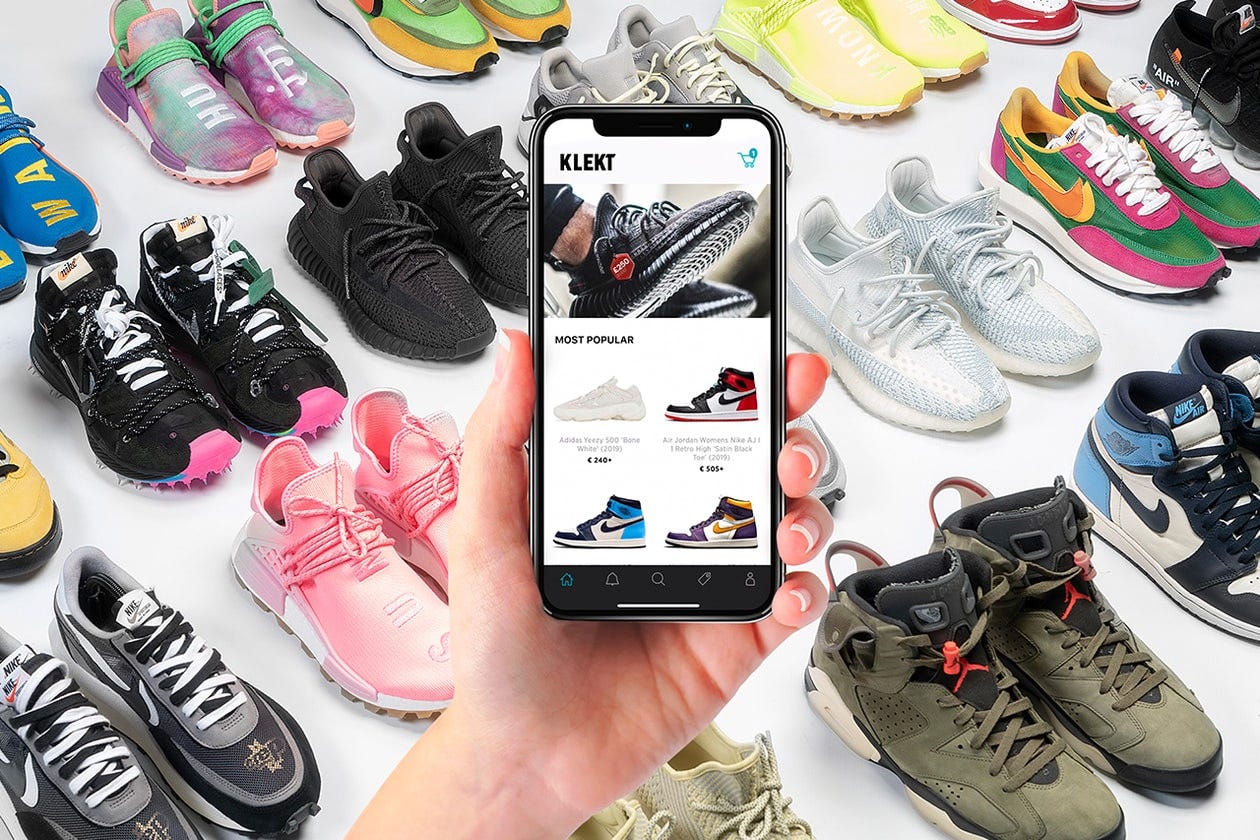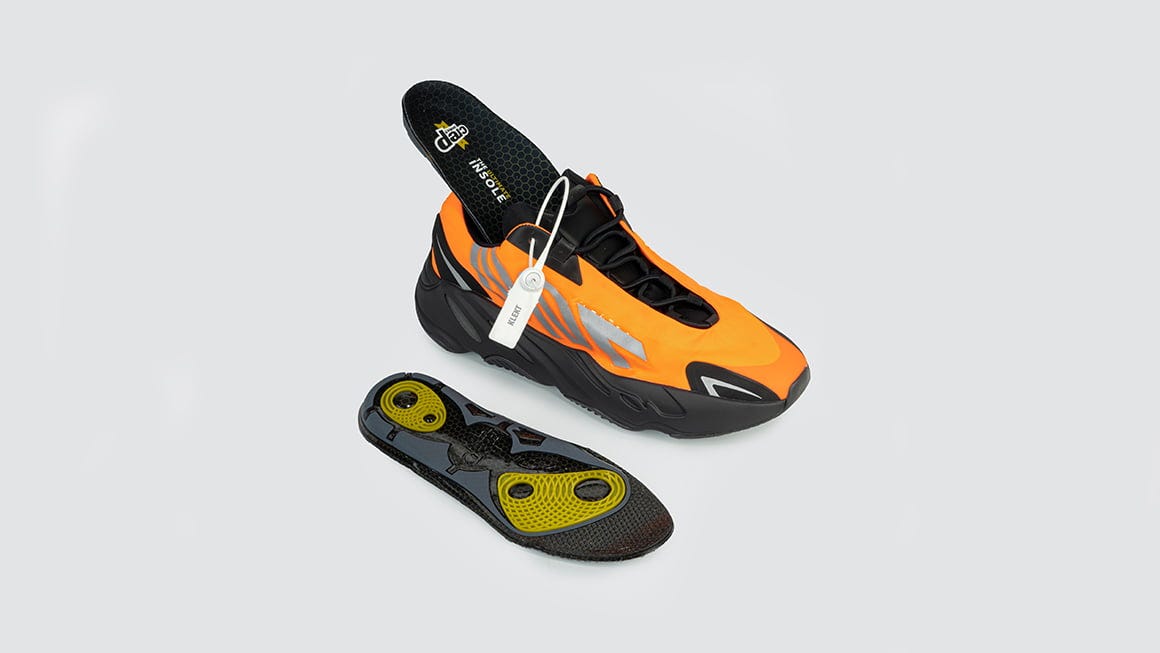More Brands Are Doing Circular Collabs
We explore how brands are partnering with Depop, eBay, Vestiaire Collective and others to develop circular business models.
Fashion’s pursuit of a more sustainable future will be defined by its key players’ creativity and willingness to explore business models that don’t solely rely on the production of more stuff.
In this piece, we focus on the online marketplaces – such as eBay, Depop, and Vestiaire Collective – that are leading the charge, highlighting how their use of collaborations and partnerships impacts consumers’ perception of and relationship with circular fashion, and what fashion brands can learn from their efforts.
Previously, we evaluated the Scandinavian region’s gold standard for sustainability and assessed circularity’s role in driving change; now, we examine the role of creative collaboration and partnerships in bringing circularity to the forefront of fashion’s pursuit of sustainability.
eBay
Founded in 1995, eBay is one of the longest-standing online marketplaces. Thanks to its international brand recognition, pop-cultural relevance, and enormous 135 million-strong user base, it’s often regarded as the premier destination for pre-loved and vintage goods.
Innovating in the favour of its buyers and sellers has been an essential part of its continued relevance and market dominance. In 2020, following the sharp rise in popularity of secondary market platforms like StockX and GOAT, eBay launched its Authenticity Guarantee.
The Authenticity Guarantee – which allowed buyers to get their sneaker purchases authenticated before receipt – proved to be massively successful, and would go on to be extended across multiple categories, including luxury handbags, watches, and jewellery in collaboration with the Gemological Institute of America.
Although eBay has built a reputation for trust over its almost 30 years of operation, counterfeit goods have become a significant issue for second-hand shoppers. Its commitment to re-establishing trust and creating a safe environment for buyers and sellers that trade in new and pre-loved goods has seen it rise from strength to strength.
Collaboration has played a significant role in its self-promotion as a leader in circular fashion and encouraging consumers to embrace sustainable buying habits:
eBay Sneakers x Slawn
Tapping into communities through the experiential is one of the key tenets of New Luxury. In November 2023, eBay did so by collaborating with acclaimed London-based artist, Olaolu Slawn, to create two pieces of art inspired by the Nike x Corteiz Air Max 95 and Nike Air Jordan IV in a bit to encourage buyers to shop their sneaker grails via the platform. The resulting pieces were auctioned off via eBay following a pop-up event at Slawn’s cafe, Beau Beau’s.
eBay Sneakers x Kurupt FM
In March 2022, eBay connected with Kurupt FM to bridge music and sneaker culture. With a focus on making the inaccessible, accessible – as is achievable via online marketplace channels – they made the Nike Air Max 1 DLX Atmos Animal 2.0 and New Balance x Salehe Bembury 2002R available for £15 via an exclusive pop-up.
eBay Pre-Loved Fashion x VOGUE
Earlier this year, eBay and VOGUE collaborated to launch a charity auction, welcoming models like Jourdan Dunn and Munroe Bergdorf to auction off pre-loved fashion. The event saw exclusive, highly sought-after items from Gucci, Tom Ford, and Stella McCartney made available to the public.
Through its use of unique cross-cultural collaborations and activation, eBay has positioned itself as a leader in New Luxury circularity; by connecting with younger audiences (Gen-Z in particular) it has championed shopping for hyped sneakers and luxury fashion via pre-loved marketplaces, whilst collaborating with experts to ensure shoppers can trust buyers and the products they’re purchasing.
Tapping into cultural moments through fashion, music, and sneakers, and the personalities at the heart of each is something that brands across the board can tap into to champion their sustainable messaging.
It is, however, worth noting that authenticity is key; consumers will see through the BS if a partnership doesn’t make sense.
Depop
Depop’s unique positioning as one of the fastest-growing marketplace platforms, with a reported 42 million registered users in 2023, has afforded it significant cultural pull, which it has utilised to build a loyal following, particularly amongst Gen-Z and Millenials.
Collaborations have been central to Depop’s continued growth and overall circular fashion strategy. Targeting brands with cultural clout amongst its most active demographics has led to enormous success for the platform, leading to its $1.6bn acquisition by Etsy in 2021.
Over the past few years, the platform has built a significant portfolio of collaborations, each focalising community and experiential activations to drive engagement, encourage circularity, and build awareness:
Depop x Hypebeast Flea
Earlier this year, Depop collaborated with Hypebeast on its Hypebeast Flea activation. The New York event saw the duo spotlight six of the platform’s sellers alongside a marketplace of independent vendors, transforming their online user experience into a community-based event championing sustainability.
Depop x Vans
Depop allowed select users to work with Vans to add their own spin on some of the brand’s most iconic silhouettes, which were then sold via Depop and Footlocker.
Depop x adidas Originals
Showcasing the creativity at the heart of its community, Depop’s adidas Originals collaboration gave 40 users the opportunity to create their own unique take on the Stan Smith PRIMEGREEN. A silhouette crafted using recycled materials, the Stan Smith PRIMEGREEN maintained a sustainable focus within the collaboration, further emphasised by the three creatives’ reworking of select apparel pieces.
Depop Collaborators
In 2022, to spotlight independent brands and artists, Depop connected with five global creatives and collectives to spark conversations concerning art and circular fashion. Each led collaborative workshops, installations, interactive pop-ups, and exclusive products on their Depop storefronts.
Depop, in its mission to create a global community driven by a desire to create, inspire, and champion circular fashion, has demonstrated the power of community-led initiatives, and how thought leaders play an important role in building a more sustainable future for fashion through opportunity, access, and awareness.
Vestiaire Collective
Vestiaire Collective has quickly become the go-to marketplace platform for high-end, luxury designer goods—and for good reason.
Since its founding in 2009, the platform has built an impressive user base of an estimated 11m spanning 80 countries. In 2021, it boasted 3m items listed, with 550,000 new items listed per month.
Its sustained growth is largely thanks to the reputation of trust it has built with its users through expert authentication and counterfeit detection, led by a 140-strong team – 50 in Quality Control and 90 in Digital and Physical Authentication – specialising in luxury, gemology, watchmaking and streetwear.
This meticulous dedication to authenticity extends beyond the platform itself:
Signing the Charter for fighting counterfeiting on the Internet between IPR holders and e-commerce platforms in 2012.
Inclusion in the Sustainable Market Initiative (or SMI) and its sub-group Fashion Task Force.
The Vestiaire Academy – a team dedicated to continuously training its experts and staying up-to-date on the latest practices.
As a result of these commitments, it’s built strong brand relationships that have bolstered its collaborative network and helped it establish Resale as a Service (Raas).
Launched in 2021, Raas has enabled brands and retailers to offer resale to their customers.
Items are collected through a digital platform, and customers are rewarded with store credit, and the items are then sold on Vestiaire Collective through a dedicated page. Since launching, RaaS has seen Vestiaire partner with leading brands and platforms like Gucci, Alexander McQueen, Mulberry, and Mytheresa.
These official partnerships have played a fundamental role in solidifying trust between buyers and sellers while leveraging online marketplaces as a viable destination to shop for pre-loved luxury goods.
The biggest takeaway for brands is: trust is a non-negotiable, especially where circularity is concerned. As such, transparency is essential.
Klekt
The rise of the sneaker resale market has been the biggest cultural shift the sneaker industry has undergone in the last decade. Where buyers once camped out for a chance to secure their sneaker grails at retail, bots dominate online raffles and shock drops, giving resellers the power to control the market.
Over the past couple of years, sneaker manufacturers (Nike in particular) have developed anti-boy countermeasures to bring a sense of balance and fairness back into the sneaker market. Despite this, resale platforms have demonstrated enormous success thanks to their ease of access—you can buy and sell in seconds, knowing that your products will be authenticated.
Back in 2019, Klekt entered a partnership with shoecare powerhouse Crep Protect to broaden the scope of its services—in particular, by offering worldwide shipping.
Before their partnership, the resale market leaned heavily in favour of singular platforms, like StockX, creating a seller market that stripped the sneaker industry of the culture so many had fallen in love with.
Klekt – one of the select resale platforms offering used sneakers – has used this partnership to the buyers’ benefit, as they’ve enjoyed increased access to their most beloved styles.
ASOS Marketplace
When you think of ASOS, circularity is unlikely at the front of your mind. The British online retailer is undoubtedly best known as a fast-fashion outlet, stocking a near-endless supply of brands including Carhartt WIP, Nike, and adidas, alongside in-house products.
Its successes over the years have been astronomical, pulling in £1.8bn of net sales in 2022. Despite this success having been largely achieved through its fast-fashion output, it has been part of the circular fashion conversation since 2010, when it launched ASOS Marketplace.
A humble undertaking that started with a select line-up of 20 sellers, the vintage, pre-loved, and independent marketplace now boasts over 800 sellers from across the globe.
In 2022, ASOS Marketplace introduced its first collaboration. Three of the platform’s independent boutiques were provided with a selection of samples from ASOS’ in-house brand COLLUSION. These deadstock samples were then reworked into a 60-piece capsule collection supported by ASOS, with 100% of sales going to the collaborator boutiques.
Although ASOS certainly plays a significant role in fashion’s sustainability dilemma, its marketplace collaboration demonstrates how samples and headstock can be utilised to provide opportunities to budding designers, boutiques, and brands while avoiding waste production.
Conclusion
Be authentic: New Luxury consumers, Gen-Z in particular, can and will see through the BS. The messaging and direction of a circular initiative need to serve a purpose and be actionable; this will reflect in the results.
Establish trust: Building trust for your platform and between buyers and sellers is fundamental to the success of any marketplace. Brands can utilise the tools available to them via marketplaces like Depop or Vestiaire, but if users aren’t guaranteed authenticity through expert analysis or full traceability, they’ll go elsewhere.
Be transparent: Consumers tapping into circular fashion are more conscious of their shopping decisions. Typically, they’re more environmentally aware and, as such, want to know more about the products they’re buying. Being transparent affords buyers peace of mind while demonstrating that your platform or products are circular.
Embrace community: Providing your community with opportunity, access, and awareness is a significant part of reshaping perceptions concerning circularity and its importance in achieving a more sustainable future for fashion.




